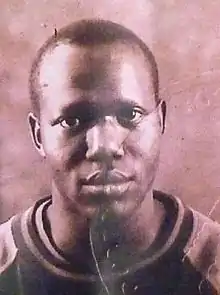Sipho Jele
Sipho Jele was a member of the banned Swazi political party People's United Democratic Movement (Pudemo) as well as the Swaziland Agricultural and Plantations Workers Union (SAPWU), part of the Swaziland Federation of Trade Unions (SFTU). He died in police custody in Swaziland, after having been arrested on 1 May 2010, at the SFTU May Day celebrations, for having worn a T-shirt with a Pudemo logo.[1][2][3] Sipho Jele was found hanging from the rafters of a toilet at the Sidvwashini Correctional facility where he was being held on 4 May.

Murder case
Sipho Jele was a former employee at Swaziland's only pulp mill, and was studying engineering at the time of his death. He had been charged with high treason in a high-profile trial in 2006,[4][5] accused of taking part in a bombing campaign, but was acquitted along with all the other accused.
According to Sipho Jele's aunt, who had previously worked as a nurse for 30 years and who saw the body, there were several indications that he had not committed suicide as claimed by the Swazi police, including a swollen face, blood having come out of his nostrils, and the fact that he hadn't soiled himself – as is commonly the case with those who have hanged themselves. The police officers in whose custody Jele was claimed they didn't kill him, although they admitted to have broken protocol on several accounts when arresting and detaining Jele.[6]
The Swazi regime has been much criticised in relation to Jele's death especially by Swazi democracy organisations, foreign unions such as Cosatu,[7] and South African,[8] American[9] and Danish newspapers[2] and websites, as well as NGOs.[10][11]
An independent investigation into the cause of the death was promised on 7 May by the Prime Minister of Swaziland.[12] According to evidence given by Manzini-based police officers at this inquest, Sipho Jele was taken out of his cell to be interrogated for hours, although the evidence given by police officers and jailers was conflicting on several points.[13] The director of public prosecutions, Mumcy Dlamini, testified at the same trial that Jele had told him he feared being «tubed», i.e. assaulted and suffocated, by police and therefore had asked Dlamini to be transferred to Sidvwashini.
Funerals
Sipho Jele's funeral was disrupted by around 500 heavily armed police. The police destroyed several pictures of Jele, as well as removing a Pudemo flag from the coffin, and then arrested and detained several of the mourners. The funeral was subsequently called off by Jele's family for fear of further arrests.[14] The funeral finally took place on 22 May, this time with a strict dress code banning any politically motivated attire or political speeches, although some of those attending disregarded this.
Notes and references
- TUC protests at suspicious death of Swazi trade unionist Sipho Jele, ´Tuc.org.uk, 11 May 2010
- /af. "DrĂŚbt pĂĽ grund af en T-shirt". Arbejderen.dk. Archived from the original on 30 September 2011. Retrieved 21 October 2011.
- , Sowetan.co.sz
- "Treason charges for Swazi attacks". BBC News. 30 December 2005. Retrieved 7 April 2018.
- "Swaziland". State.gov. 6 March 2007. Retrieved 21 October 2011.
- "The Swazi Observer". Observer.org.sz. 19 May 2010. Retrieved 21 October 2011.
- "International outcry over Swazi activist's death in detention – News – Mail & Guardian Online". Mg.co.za. 14 May 2010. Retrieved 21 October 2011.
- Peter Clottey (17 May 2010). "Swaziland Opposition Demands Supporter's Death Inquiry". Voanews.com. Retrieved 7 April 2018.
- "Swaziland: Trade Unionist Dies in Custody". Ituc-csi.org. 12 May 2010. Retrieved 7 April 2018.
- "afrol News – Swazi trade unionist "killed" in custody". Afrol.com. Retrieved 21 October 2011.
- Corruption is the key to success in SD, Times.co.sz, 25 June 2010 Archived 14 July 2014 at the Wayback Machine
- "Archived copy". Archived from the original on 3 March 2016. Retrieved 19 May 2010.CS1 maint: archived copy as title (link)
- "Swazi police disrupt funeral of Sipho Jele". Afrika.dk. 14 May 2010. Archived from the original on 6 August 2011. Retrieved 21 October 2011.